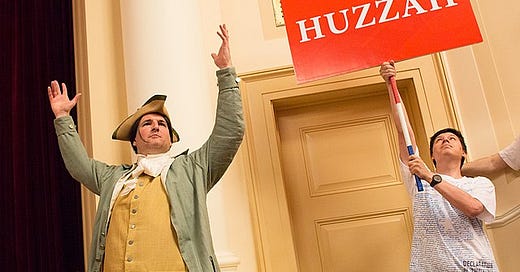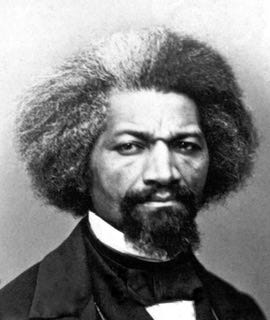Huzzah! Come and listen to—or join in—the public reading of Frederick Douglass' 1852 speech in Colburn Park in downtown Lebanon NH on Tuesday, July 4 from 11:00 am to 12:30 pm. To read one of the 54 paragraphs, arrive at 10:30 a.m. to sign up (or contact Carol Rougvie (cbrougvie@gmail.com). Hosted by Valley Insight Meditation Society in collaboration with the Lebanon Recreation, Arts, & Parks Department. Residents and visitors in Lebanon and surrounding communities are invited. Rain location: First Congregational Church of Lebanon.
On July 5, 1852, eminent African American abolitionist Frederick Douglass delivered an electrifying speech, “What to the Slave Is the Fourth of July?” to nearly six hundred people filling Rochester, New York's Corinthian Hall, organized by the Rochester Ladies' Anti-Slavery Sewing Society. Researcher and writer Paula Whitacre notes: “The Rochester Ladies Anti-Slavery Sewing Society [members numbered between 6 and 12 women] met for the first time on August 20, 1851. They didn’t do much sewing, so dropped it from their name soon after.” And mostly through gift fairs, they raised money. “According to the group’s annual reports, they raised a total of $408.57 their first year, about half of which went to “Donation to Mr. Douglass.” By their fourth year, they reported a healthy $1,524.23 in revenues.”
Readings of the speech now take place during holiday observances throughout the country. In an interview in the Harvard Gazette, Keidrick Roy, a doctoral student in American Studies at the Graduate School of Arts and Sciences and a U.S. Air Force veteran, has championed the reading of the Douglass speech in his own community. He was asked what he had learned in researching Douglass. He cited Douglass’ support for voices other than his own, including activists Harriet Tubman and Ida B. Wells. And added:
Another remarkable thing about Douglass is that he was an early champion of voting rights for women. In an 1868 speech, he said, “No man should be excluded from the government on the basis of his color, no woman on account of her sex. There should be no shoulder that does not bear the burden of the government.” He had a prophetic vision for the future that he was always trying to work toward.
*Huzzah (sometimes written hazzah; originally spelled huzza and pronounced huz-ZAY, now often pronounced as huz-ZAH;[1] in most modern varieties of English hurrah or hooray) is, according to the Oxford English Dictionary (OED), "apparently a mere exclamation".[2]The dictionary does not mention any specific derivation. Whatever its origins, it has seen occasional literary use since at least the time of Shakespeare, as the first use was in 1573, according to Merriam-Webster.[3] (Wikipedia)
Apparently, “huzzah,” an archaic, seldom used term, is often resurrected for use in enactments of the American Revolution. And on Independence Day.
Happy 4th!
(Photos via WikiCommons Images, public domain)
———————————————————
Almost 2400 subscribers and counting! You’re reading Artful, a blog about arts and culture in the Upper Valley, and I hope you’ll subscribe and then share this post with your friends and on your social media.
The Hopkins Center for the Arts helps support Artful and joins Artful in celebrating those who love, make and share the art in our community. Explore Summer 2023 at the Hop.
And in case you are wondering . . . Susan B. Apel shuttered a lifelong career as a law professor to continue an interest (since kindergarten) in writing. Her freelance business, The Next Word, includes literary and feature writing; her work has appeared in a variety of lit mags and other publications including Art New England, The Woven Tale Press, The Arts Fuse, and Persimmon Tree. She connects with her neighbors through Artful, her blog about arts and culture in the Upper Valley. She’s in love with the written word.




